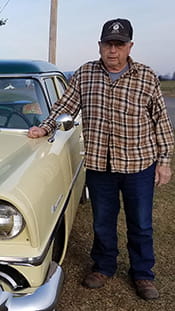The Problem: A Heart Attack
David May, 76, can’t pinpoint when exactly his heart problems began.
“Looking back, things were probably building up over the last year,” David says.
The retired Muncy, Pa. native chalked up the slight changes in his health to age.
“I had shortness of breath, but I thought that was just because I was getting old. Occasional indigestion didn’t concern me very much either. I didn’t realize how off I was feeling,” says David.
But, in August 2018, David — an Army vet — had chest pains that quickly became a heart attack. EMS took him to a local hospital, UPMC Williamsport.
The Path to UPMC's Heart and Vascular Institute in Pittsburgh
After initial treatment, doctors discussed David’s case with experts at UPMC's Heart and Vascular Institute through a secure teleconference line. This partnership allows UPMC experts to collaborate with specialists throughout the UPMC system.
Doctors agreed the best course of action would be to send him to UPMC Presbyterian. Soon after, David was on a life-flight from Williamsport to Pittsburgh.
When he arrived in Pittsburgh, doctors admitted David to the ICU due to high levels of both water weight and blood pressure.
Despite being four hours from home, David wasn't alone. Family members came to Pittsburgh to spend time with him.
UPMC Heart and Vascular Institute experts kept a close eye on David’s levels and started planning next steps for his care.
The Solution: Minimally Invasive Heart Valve Treatment
After clearing David from the ICU, his care team began further assessing him for the type of treatments he would need.
David was diagnosed with aortic stenosis and mitral regurgitation. Both conditions cause blood to not flow properly between the heart and the aortic and mitral valves, leading to a variety of symptoms and complications.
UPMC experts determine that David was not a good fit for open heart surgery.
Thankfully, there were treatments other than open heart surgery to address David's issues.
UPMC experts including A.J. Conrad Smith, MD, associate chief of cardiology for Diversity, Equity, and Inclusion in the Division of Cardiology, performed three separate procedures on David’s heart.
“I like to think of it as being fixed one piece at a time,” David chuckles.
#1. Stents
First, David received two stents to restore proper blood flow after his first heart attack. This is common treatment to open narrowed blood vessels to help restore proper blood flow.
#2. Transcatheter aortic valve replacement
David's care team then treated his aortic stenosis using the transcatheter aortic valve replacement (TAVR) procedure. TAVR is a minimally invasive treatment option.
Doctors used special x-ray imaging to guide a catheter holding the replacement valve to David’s aortic valve. The replacement valve — made of biological tissues inside a stent — expanded over David’s damaged valve to restore proper blood flow.
#3. Mitral valve repair
After David healed for a few days, Dr. Smith repaired David’s leaking mitral valve.
The mitral valve is between the heart’s left chambers. It works to keep blood flowing.
When the mitral valve doesn't close tightly, it can prevent blood from flowing correctly or cause blood to flow backward. This causes a build-up of fluid in the lungs, leading to symptoms such as the shortness of breath David had.
Dr. Smith used the MitraClipTM to repair David’s leaking valve.
Like TAVR, Dr. Smith inserted the MitraClipTM via a catheter. He guided the clip into the left chambers of David’s heart and placed it over the leaky mitral valve.
“My oxygen levels drastically improved not long after the procedure. I was able to go home a few days later,” David says.
The Results: Enjoying Hobbies
After being discharged from UPMC Presbyterian, David spent a week and a half at UPMC Muncy to make sure he healed properly.
He then began cardiac rehab.
Cardiac rehab is an outpatient exercise program after a heart disease diagnosis or treatment that helps:
- Strengthen the heart muscles.
- Increase energy.
- Maintain a healthy weight.
Since UPMC offers cardiac rehab across the system, David did his rehab in Williamsport, which is conveniently located near his house.
After treatment, David's breathing has improved, and he's feeling much better.
Now, he's back to enjoying his hobbies, including:
- Hunting
- Baking
- Coin collecting
- Taking his 1955 Mercury to car shows
David likes to drop off baked goods to the staff at UPMC Muncy to thank them for the care he received.
“Everybody at UPMC was great,” David exclaims.
After a 30-day post-op checkup, David's doctors told him he didn't need to return to Pittsburgh until the one-year mark from surgery. He follows up with Scott Rosenbaum, PA-C, at UPMC Williamsport for care close to home.
David remains grateful for the care he received at UPMC, both in Williamsport and Pittsburgh.
“Everything they did for me worked,” he says.
David's treatment and results may not be representative of similar cases.
Read more Heart Valve Disease patient stories
















